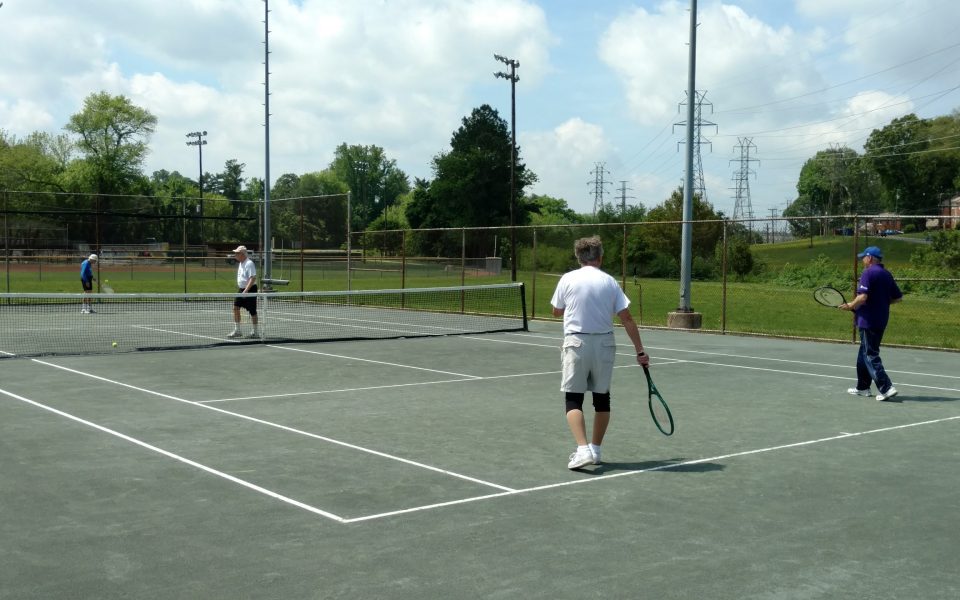At high noon Dick Rosen stooped in the hot sun, a brief pause before tossing a tennis ball into the air to attempt his third serve of the point. Rosen had just served a let, then a fault. The temperature had climbed through the mid-80s, and the humidity simmered over 50 percent. Sweat poured from his body.
He could have been any tennis player confronting the tiring court conditions as April closes into May, but there was something unique in Dick Rosen’s case. It wasn’t lingering exhaustion from his track events two days prior, or the toll of mental preparation for the 10K two days away.
Rosen is 86 years old.
On April 28, he sided with Bruce Haldeman as they faced Marty Benjamin and Bill Wladyka in a gold medal match of men’s doubles tennis in Greensboro’s Latham Park Tennis Center.
The Greater Greensboro Senior Games, which celebrated its 30th anniversary this year, provides Olympic-style athletic events to promote healthy mental and physical lifestyles for those over 50 years old. Men and women in five-year groups — beginning at 50-54 and advancing up to 90-94 — compete in events including track & field, swimming, cornhole, bocce and others. This year, more than 250 participants competed — the most to date.
As Rosen and Haldeman battled against Benjamin and Wladyka, Event Director Marya Haefner sat with Faye Benjamin, Marty’s wife, cheering the players on. Haefner has been involved with the games for 15 years, and each spring she works with seniors who find purpose, accomplish goals and make new social relationships through the contests.
Triumphs in spirit are often as valuable as the physical achievements.
“It’s an opportunity to bring back a competitiveness, or to find it,” Haefner said.
As a spouse and a spectator, Faye Benjamin has witnessed this competitiveness firsthand.
“[Marty] started out playing three events [each year],” Faye explained. “Now it’s up to 20.”
For Dick Rosen — a retired physician — the games’ month-long events are an important opportunity to remain active.
“We’re proving [tennis is] a lifetime sport,” he said. “[And] it’s nice to be vertical.”
Though the games don’t end until Friday, Rosen has already tallied more than 10 gold medals. But often he was the only participant in his 85-89 age group for track events such as the various meter dashes and the 5K. Rosen pointed out that he has technically finished first and last in several of the events.
Doubles partners Rosen and Haldeman — both in their eighties — have played tennis together for more than 15 years, and they try to play at Latham Park every week. While many relationships in the Senior Games are based on similar history and support, their opponents — Marty Benjamin and Bill Wladyka — have had a more contentious dimension to their partnership over the years.
In 2016, Wladyka lost to Benjamin in bocce by only an eighth of an inch — a contest in which Faye Benjamin played a role, too.
“I think I was talking more trash to Faye than to Marty,” Wladyka recalled. “She kept blessing his ball and kissing it, and I kept trying to throw dirt on it.”
From how Wladyka and Benjamin put it, trash talking seems an integral part of their Senior Games — at least as long as the players are up for it.
“We’re too tired to talk trash on the tennis court,” Benjamin explained after the doubles match ended.
A relative exhaustion frequents his doubles partner much as it would an athlete of any age, though Wladyka described it in a humorous light.
“As the younger guys come in, I’m on the way down,” he lamented.
This year, at age 73, he has endured his third consecutive wave of competitive new 70-year-olds, while he has aged toward the older end of the group.
In 2017, the Senior Games have seen evidence of old traditions and new feats. Haefner said the torchbearer for this year’s ceremony participated in Greensboro’s first Senior Games 30 years ago. Haefner also revealed that a woman in her fifties ran a mile in under six minutes earlier in the competition.
For Wladyka, despite the spritely new 70-year-olds each year, it seems he has at least one event down pat.
“Croquet — that’s my forté,” he proclaimed.
For the third year in a row, Wladyka took gold in the event.
Join the First Amendment Society, a membership that goes directly to funding TCB‘s newsroom.
We believe that reporting can save the world.
The TCB First Amendment Society recognizes the vital role of a free, unfettered press with a bundling of local experiences designed to build community, and unique engagements with our newsroom that will help you understand, and shape, local journalism’s critical role in uplifting the people in our cities.
All revenue goes directly into the newsroom as reporters’ salaries and freelance commissions.


Leave a Reply